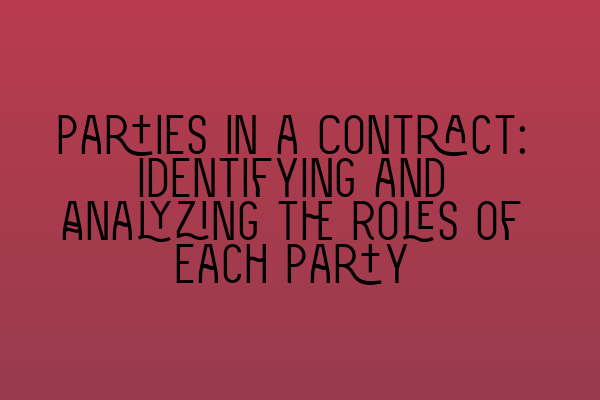Parties in a Contract: Identifying and Analyzing the Roles of Each Party
Contracts are an integral part of any business transaction or legal agreement. They establish the rights and obligations of the parties involved and ensure that both parties are held accountable for their actions. To understand contracts better, it is essential to identify and analyze the roles of each party. In this article, we will delve into the different parties in a contract and explore their responsibilities.
The Main Parties in a Contract
1. Offeror: The offeror is the party who initiates the contract by making an offer. This party makes a proposal to another party, known as the offeree, suggesting specific terms and conditions. The offeror holds the power to create the terms of the contract and has the right to revoke or modify the offer before it is accepted.
2. Offeree: The offeree is the party to whom the offer is made. They have the option to accept or reject the offer presented by the offeror. If the offeree accepts the offer, a legally binding contract is formed. The offeree’s role is to carefully review the terms of the offer and respond accordingly.
3. Promisor: The promisor is the party who makes a promise or provides consideration in exchange for something from the promisee. The promisor is obligated to fulfill their promises or obligations, as stated in the contract. They are bound by the terms of the agreement and can be held liable for any breach.
4. Promisee: The promisee is the party who receives the promise or consideration from the promisor. They have the right to expect the promisor to fulfill their obligations as per the contract. If the promisor fails to deliver on their promises, the promisee has the right to seek legal remedies for breach of contract.
5. Third-party: In some contracts, there may be a third-party involved who has rights or obligations that are separate from the offeror, offeree, promisor, or promisee. These third parties may be beneficiaries of the contract or have specific responsibilities outlined within the agreement. It is crucial to identify and define the role of any third-party in a contract to ensure clarity and avoid misunderstandings.
Understanding the Roles and Responsibilities
Each party in a contract has specific roles and responsibilities that they must fulfill. Let’s take a closer look at these responsibilities:
1. Offeror: The offeror is responsible for:
- Making a clear and unambiguous offer
- Ensuring that the offer is communicated to the offeree
- Defining the terms and conditions of the contract
- Revoking or modifying the offer if necessary
2. Offeree: The offeree has the following responsibilities:
- Carefully reviewing the terms of the offer
- Responding to the offer within the stipulated timeframe
- Accepting or rejecting the offer based on their evaluation
- Communicating their acceptance to the offeror
3. Promisor: The promisor must:
- Fulfill their promises and obligations as stated in the contract
- Deliver the agreed-upon goods or services
- Ensure timely performance of their obligations
- Compensate the promisee as specified in the contract
4. Promisee: The promisee is responsible for:
- Expecting the promisor to fulfill their obligations
- Communicating any changes or modifications to the contract
- Providing necessary cooperation or support to the promisor
- Seeking legal remedies in case of a breach
5. Third-party: If a third-party is involved in the contract, their role and responsibilities must be clearly defined to avoid confusion or disputes. It is vital to specify their rights, obligations, and any specific terms related to their involvement.
Conclusion
Understanding the roles and responsibilities of each party in a contract is crucial for ensuring a smooth and successful agreement. The offeror, offeree, promisor, promisee, and any involved third parties all play integral roles in the contract’s formation and execution. By clearly identifying and analyzing the roles of each party, all parties can enter into the agreement with a clear understanding of their obligations and rights.
To enhance your understanding of contract law and further prepare for the SQE exams, you may consider accessing the following related articles:
